For a government limping along under the rule of its fifth prime minister in six years, drenched in sleaze and infighting, conventional wisdom says surely the Tories can’t survive the next general election. But then this is politics, and anything can happen.

Just 100 days into office, and Rishi Sunak’s government was dogged by yet more sleaze, despite the prime minister’s ‘sleaze-busting’ assurances. In an attempt to stamp authority and shore up support following Nadhim Zahawi’s tangled tax affairs scandal, this week the prime minister hastily made a cabinet reshuffle, alongside a sweeping Whitehall restructure.
As the government continues to drown in sleaze, a poll out this week showed that more than half of voters want a general election now, suggesting Sunak’s cabinet changes may be too little, too late to sway voters.
A separate poll for the Telegraph found. that if a snap election was to take place, not only would Labour gain 306 seats, but the Tories would drop from 365 seats won at the 2019 election to just 45. The SNP would have 50 MPs, meaning the Tories would be wiped out even as the official opposition.
But before we get to the general election, there are the local elections, which are just 13 weeks away. If the Conservatives do badly in May, Sunak could face a summer rebellion. And jitters are rising about the prospect of a local wipeout, including in so-called ‘Tory shires’. Harvey Unwin, former chairman of the Telford Conservative Association, is concerned about the party’s ability to attract candidates.
“I’ll be surprised if we have any candidates,” he said. “The local party is in crisis. We had 18 candidates last summer, but I don’t think we’ve got any now.
“We’re going to take a hammering at the local elections, and a hammering at the general election. And I’m not surprised. Here, because the organisation of the party is in disarray, and nationally, because the position is terrible,” Unwin continued.
Meanwhile, an optimistic Labour is to use the May elections to sharpen its campaign machine and road-test some of its policy ideas ahead of the general election next year.
The results of the upcoming elections might offer a taste of what is to come in the ‘big one,’ but let’s not forget that local election success does not always translate into national election success. In 2019, for example, the last time local seats were fought, the Tories lost control of 44 councils and over 1,300 council seats. Despite being the party’s worse local election performance since 1995, six months later, the Tories won a landslide victory in the general election, smashing Labour’s ‘Red Wall’ and claiming wins in seats that they had never before held.
Chequers’ survival plot
While grassroot Tory activists and local campaigners might be deflated about the current situation and fear the worse in the upcoming elections, at the prime minister’s official country residence of Chequers, the tone was more upbeat. Gathering at the Buckinghamshire dwelling in late January, a survival plot got underway.
Heading up ‘team endurance’ was elections guru Isaac Levido. Labour’s lead is “softer than it looks,” he said in a pep talk to cabinet ministers. Levido, the political strategist who ran Boris Johnson’s successful 2019 election campaign, said the party has a ‘narrow’ path to election victory, provided they can end toxic infighting and deliver on the public’s priorities.
With opinion polls having consistently put Labour more than 20 points ahead since last summer, it could be easy to believe that Levido’s fighting talk is nothing but sugar-coated ‘dressing room’ hype designed to boost morale during despondent times. But does it hold any weight?
Levido warned the cabinet that party discipline and solid adherence to a core Tory message is vital. Saying that 2023 was going to be a tough year, and the party had to hold its nerve, the strategist said: “We can win, but it depends whether our MPs actually want to win.” Under Levido’s plan, Sunak will focus relentlessly on the ‘five promises’ he made at the start of the year, to half inflation, reduce public debt, cut NHS waiting lists, grow the economy, and ‘stop small boats’ carrying migrants across the Channel.
Staking his premiership on five pledges that, other than the small boats promise which could prove more difficult to attain, should be achievable because of the current trajectory of the economy, meaning the PM has set himself a relatively easy task. But what about other issues facing the government, which could reasonably be considered ‘people’s priorities,’ that didn’t make it onto Sunak’s scorecard, such as education, social care and the ongoing strikes? Whether the electorate accedes to his request to judge his premiership on his five priorities remains uncertain.
For a government limping along under the rule of its fifth Tory prime minister in six years, with lies, sleaze, obscene wealth, noxious backbiting, favours for friends, economic turmoil and more, showing few signs of ending, despite Sunak’s efforts to look competent and authoritative, conventional wisdom says surely, they can’t survive the next general election.
But then this is politics, and anything can happen.
If we’re honest, support for the opposition might be higher than it is for the Tories, but enamoured by Labour many are not. Trust in politicians, not just Tory politicians, is at the lowest it’s been in decades. A study by the Institute for Public Policy (IPPR) in December 2021 found that 63 percent of voters view politicians as merely “out for themselves” (up from 35 percent in 1944, and 48 percent in 2014). Presumably that figure would be even higher now given the chaos that followed.
A poll from November 2022, showed that when it came to the economy, at least half the public had little or no trust in either party’s ability to manage the country’s taxes and spending or reduce the cost of living. The Tories fared worse in the poll, with just 27 percent saying they trust the Conservatives to manage spending and taxes, down from 37 percent in August. Just 17 percent back the government to reduce the cost of living.
Despite leading the Tories on managing taxation, spending and cost of living reduction, Labour is yet to receive resounding endorsement from the public, with 50 percent saying they have little or no trust in the party’s ability to manage the budget.
It could be argued that Labour’s moderate support at a time when trust in the Tories is in rapid decline, is partly owing to its leadership.
As we saw in 2019, the Tory landslide had as much to do with Johnson’s sunny, optimistic, ‘get things done’ personality than it did his agenda. By contrast, Starmer is being portrayed by some as wooden and uninspiring – traits that are inevitably being magnified by Conservative commentators. Daily Mail columnist Henry Deedes, for example, wrote in a piece that likened Starmer to tennis player Tim Henman: “The problem is he [Starmer] remains so woefully wooden. I’ve seen grittier performances in lost episodes of Crossroads.”
And of course, the Tory press will do its best to discourage on-the-fence electorate from voting Labour. No doubt a conveniently-timed Labour ‘scandal’ – a bit like the phoney ‘Beergate’ scandal that was hawked in the press when the Sue Gray report drama threatened to topple Boris Johnson – will magically appear as the election campaigns get under way.
That said, the Tory press doesn’t seem too smitten by Rishi Sunak and his tax rises, to put it mildly. The excruciating 4,000-word article penned by Liz Truss in last week’s Sunday Telegraph, in which she blamed the ‘left-wing economic establishment’ on her downfall, shows where the right-wing media’s priorities lie. The grand Liz Truss ‘comeback’ touted in the Telegraph seems to be part of a plot to persuade Sunak to slash taxes or the party’s dead meat. Right-wing Conservative MPs, including former party leader Iain Duncan Smith, are clamouring for tax cuts in the March Budget.
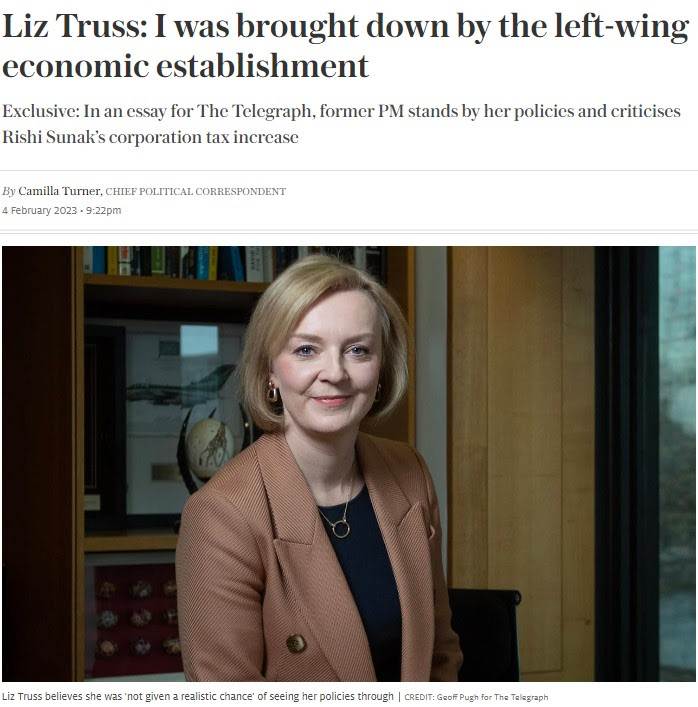
The Daily Mail ran a slew of front pages demanding lower taxes. “Hopes are growing that Chancellor Jeremy Hunt can ease the eye-watering burden on Brits by the autumn, with fears it could be the only ‘narrow path’ to the Tories winning the next election,” wrote the Mail.
Boris Johnson himself has waded into the argument. Throwing the gauntlet at Sunak, the former prime minister has insisted that the Tories will win the next general election if Sunak cuts taxes.
“The economy will start to improve, inflation will come down, people will reward the Conservative party, they will reward the government for being sensible, for cutting their taxes and for getting things done that they need done,” he said in an interview with his close ally Nadine Dorries on talkTV.
Polls don’t always get it right
As the anti-tax crowd in government abetted by the media fight for the slashing of taxes as being the only way out of a general election catastrophe, Labour has been riding high in the polls.
Multiple polling might put Starmer’s Labour ahead, but as we have seen time and time again, the polls can get it wrong. The election result in 1970 took everyone by surprise. The opinion polls prior to the election brought alarming news about the Tory Party’s prospects. But on election day, a late swing gave the Tories a 3.4 percent lead, bringing six years of Labour rule to an end. On the win, Ted Heath declared with characteristic self-satisfaction, a bit like Boris Johnson: “ I daresay that some senior members of the party panicked at times, but I always remained confident.”
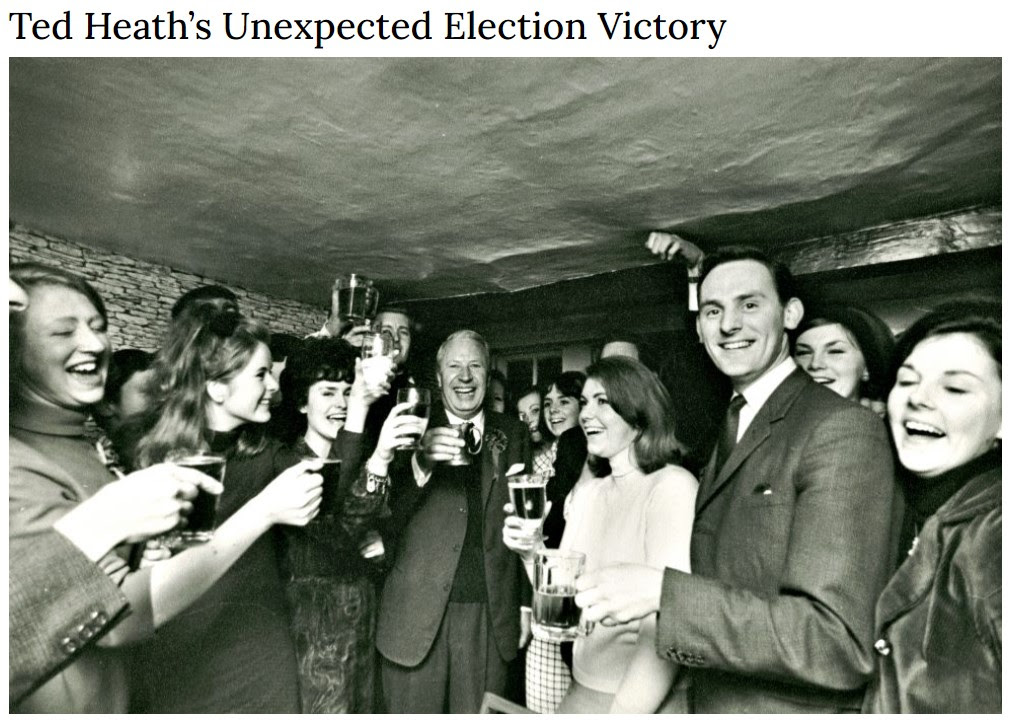
Mid-term polls aren’t known for their flawless predictions. In the early 1980s it was thought Thatcher was finished but she went onto win a huge majority in 1983.
In 1992, Labour’s loss at the ballot box has been described as one of the “mysteries of 20th century politics.” The Tories’ win after 13 years in power, and at the end of the longest recession in more than 50 years, with unemployment rising, interest rates above 10 percent and house prices collapsing, was a result nobody expected.
If any time an election result can be pinned on media influence, it was in 1992. ‘It’s The Sun Wot Won It’, bragged what was Britain’s highest-selling tabloid newspaper at the time. In his resignation speech as Labour leader, Neil Kinnock even said that ‘the Conservative-supporting press has enabled the Conservative Party to win yet again’.
In 2010, there was another election upset when the Tories, despite the predictions, failed to win an overall majority. It was the same story in 2017, when the vote yielded a hung parliament in what was a shock setback for Theresa May. This was despite all final polls anticipating a clear Tory victory.
Then there was the EU referendum. Numerous polls wrongly predicted that the UK would vote Remain. The media’s inference in the result has often been raised. A report from the Reuters Institute for the Study of Journalism showed that UK press coverage in the weeks leading up to the vote was dominated by pro-Leave articles.
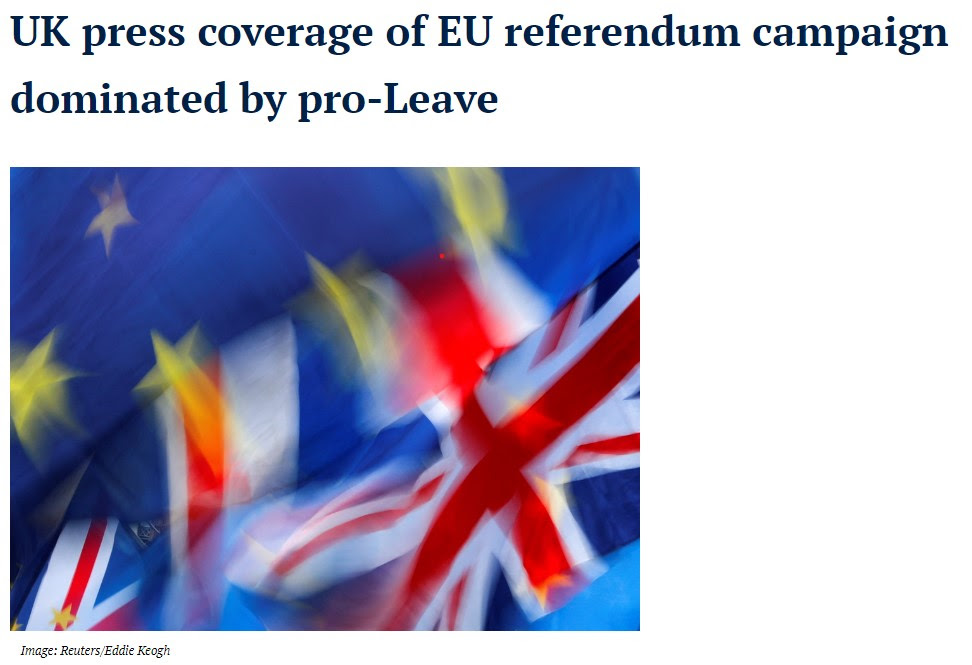
Of course, all these historical examples of poll error have to be treated with caution. In 1970, there were real concerns at rising inflation which surfaced on polling day. Thatcher’s 1983 election victory was greatly helped by splits in the Labour Party and the Falklands war. In 1992 John Major was popular, much more popular than his party and certainly more popular than Sunak is today. Something like 20 percent of voters don’t make up their minds on who to vote for until the final days and this group is growing with the weakening of ‘tribal’ politics. So much political water to flow under Westminster Bridge as yet.
Labour opinion polls ‘count for nothing’
Labour MP Alan Milburn has warned that Labour opinion polls count for nothing, and that the Tories will not give up hope of winning the next general election. Speaking to GB News, Milburn warned that Starmer and the Shadow Cabinet couldn’t get complacent.
“I remember the general election campaign in 1997, and although the opinion polls were saying Labour was going to have a landslide, not one of us believed it.
“So, there was no sense of complacency. We were running through the finishing line. We weren’t ambling towards it, taking it for granted.
“Opinion polls count for nothing. I mean, they really count for nothing. What really counts, there’s only one opinion poll that counts, and that’s at the general election.
According to Milburn, Rishi Sunk will call the general election as late as possible.
“Why is he going to do that? Because he’s twenty points behind in the opinion polls. So he needs all the time he can get in order to try to claw that lead back, and, at a minimum, try to prevent Labour from getting an overall majority.”
Historically, as the political cliché goes, it is not the opposition that wins elections, it’s the government that loses them. In today’s context, the Tories should be obliterated. 12 years of austerity, the disaster that is Brexit, the scandal-riddled Johnson years, and equally fractious post-Johnson times, and an economy set to fare worse in 2023 than any other country in the developed world, they surely have no right to win. But, worryingly, with their cronies at the right-wing press and multi-billionaire donors, Labour doesn’t start on an even playing field with the Tories.
In this sense, a Tory wipeout is by no means certain.
Right-Wing Media Watch – Lord Hannan sets his sights on pensions
‘Lord’ Hannan, one of the architects of Brexit and famous for calling the NHS a ’60-year mistake’, now has his sights set on pensions.
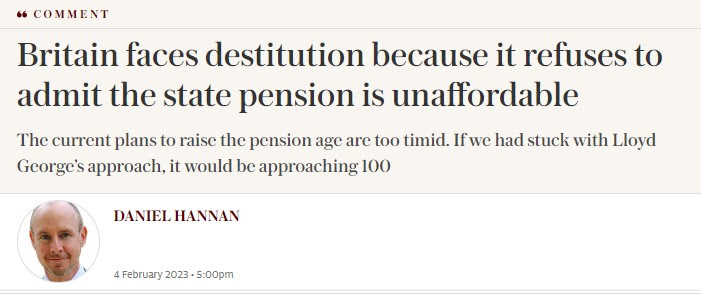
Writing for the Telegraph, Hannan claims Britain faces destitution because it refuses to admit the state pension is unaffordable. The member of the House of Lords, begins the article by describing how in 1908, David Lloyd George, the new chancellor, announced the government would pay a state pension of five shillings a week to every citizen over the age of 70, excluding only drunks, criminals, lunatics, and people earning more than £26 a year.”
Speaking of lunatics, the author notes how the ‘fledgling Labour Party was furious,” protesting that people would not live long enough to make a claim – life expectancy was 49 for men and 53 for women at the time although this was partly due to high levels of infant mortality – and demanded that payments start at 60. The point Hannan was making was that if we had stuck with Lloyd George’s approach, the pension age now would be approaching 100.
A staunch Eurosceptic, Hannan refers to the equalisation of pension ages, which now stands at 66 for both sexes, as having been demanded by the EU.
According to the author the proposed pension rises to 68 in 2035 are far too timid, and that any savings derived from austerity, are easily swallowed up many times over by the rise in longevity.
With an estimated net worth of between $1 million and $5 million, unlike the rest of us, it’s fair to say that retirement age-raising guru Daniel Hannan doesn’t have to worry too much about what age he collects his pension. Warnings that raising the retirement age would adversely affect low-income workers who find it more difficult to save for a private pension, don’t enter Hannan’s argument.
Though the pension-bashing article comes as little surprise, as Hannan seems to spend his time making sweeping statements that prove to be as far from reality as they could possibly be.
Described as the man who brought you Brexit, Lord Hannan of Kingsclere, writes regular columns for the Telegraph, ConservativeHome and the Washington Examiner. He serves on the UK Board of Trade and is a Vice Chairman of the Conservative Party responsible for its international relations. He sat as a Conservative member of European Parliament for 21 years, fighting for what he calls British independence. In 2020, he was conferred a life peer following nomination from the then prime minister Boris Johnson.
On June 21, 2016, two days before the EU referendum, Hannan penned a piece in Reaction, a news analysis and commentary site. ‘What Britain looks like after Brexit’, is ‘set’ on June 24, 2025, when Britain is marking its annual Independence Day celebration. When reading the piece, I thought it must be some kind of satire, because its imaginary scenarios about how great the country is because of Brexit, are the exact opposite of what’s happening today.
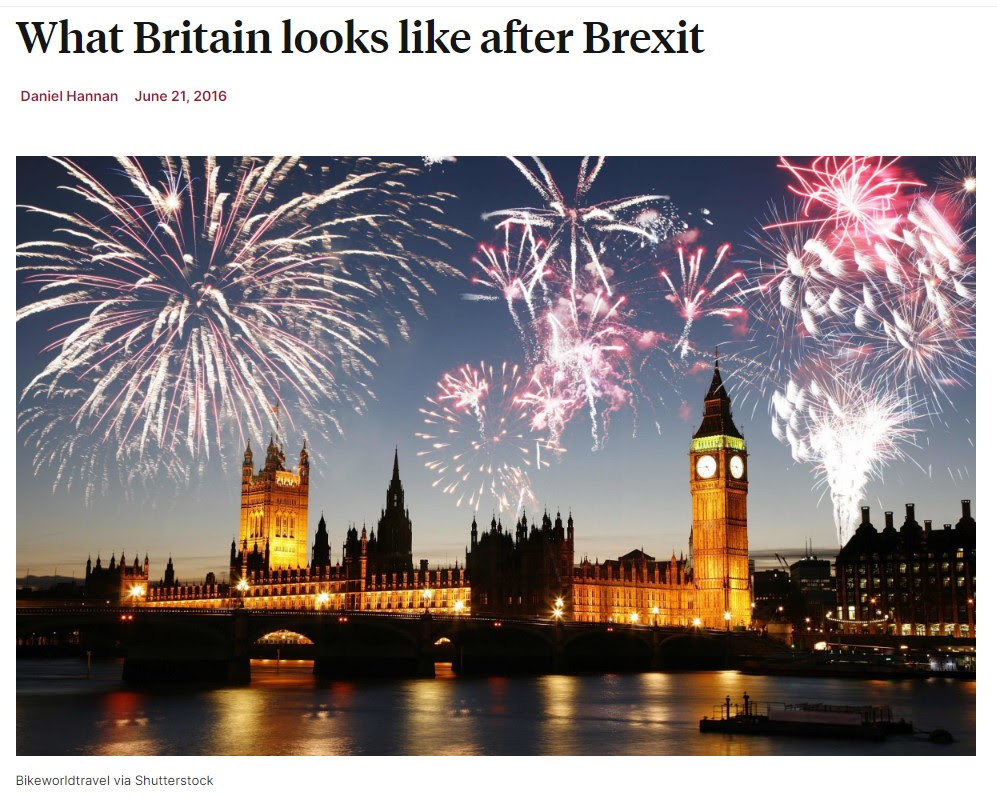
From ‘improved relations with our neighbours,’ to the revival of older industries as, wait for it, ‘energy prices have fallen back to global levels,’ and ‘terms were agreed easily enough,’ Hannan’s imagined Brexit Britain really is an hilarious read. All it needs is some maypole dancing and peasants tugging their forelocks to complete the picture.
Jokes aside, this drivel gets published in earnest in purportedly serious and undoubtedly influential newspapers. In 2018, Lord Hannan decided to argue that the Good Friday Agreement has failed. Just this week, he used the pages of the Daily Mail to argue why Britain needs to quit the ECHR, if Sunak’s plan to stop small boats fail.
In his column in ConservativeHome, Hannan, a flagrant Trussite, spews specious hype about the economy. This headline in September 2022 during Truss’s premiership, took some processing…No, the pound isn’t crashing over a trifling batch of tax cuts. It’s because the markets are terrified of Starmer. As did this one: Ignore the anti-Brexit fanatics – Britain is doing just fine.
It wouldn’t be surprising if Lord Hannan started touring the US rubbishing our pension system, just as he criticised the NHS in a series of American interviews in 2009. The then Conservative leader David Cameron branded Hannan’s views on the NHS “eccentric,” and sought to distance his party from the comments.
Eccentric might be too affable a word to describe Lord Hannan of Kingsclere’s rants. Idiotic might be more fitting.
Woke Bashing of the Week – Anti-wokesters relish the return of Basil Fawlty
It was announced this week that the much-loved 1970s’ sitcom Fawlty Towers is to return to TV for a rebooted series. The new series is being written by John Cleese with his daughter Camilla. The comeback of the famously un-PC Basil Faulty sent the culture war warriors into excitement overdrive, feverishly exalting that the revival is just what is needed to put the country ‘back on track.’
‘Too woke, broken Britain needs Basil Fawlty more than ever’ splashed the Telegraph. Comparing the ‘economic woes, strikes and ineptitude’ of 1975, when the series’ first ran, to the country’s troubles today, the article argues that John Cleese’s reboot ‘could not be better timed.’ Cleese has a ‘vehicle to prick progressivism’ says author Dominic Cavendish, who described the reaction to the series’ revival announcement being saturated with ‘scoffing nay-sayers who see it as a threat to the show and its creators’ legacies.’
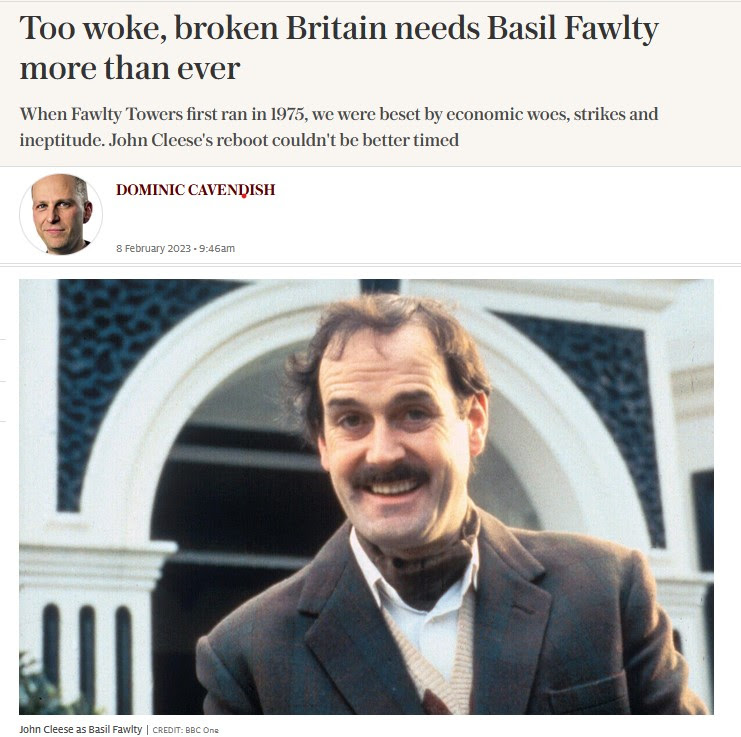
The Scottish Daily Express reported that Fawlty Towers is to be revived with John Cleese as a ‘anti-woke hero Basil.’ What such comments ignore, is that Basil Fawlty was a ridiculous figure in the original series, precisely because he was reactionary and obsequious who people laughed at and not with. He was very funny but never any kind of hero, still less an anti-woke one.
As well as the Fawlty Towers’ return, it was announced this week that the 83-year-old Cleese is to join the presenting line-up of GB News, insisting it is ‘not a right-wing channel’ but a ‘free speech channel.’ Cleese, who spends his time moaning about the modern world and seems tediously obsessed with wokeism and cancel culture, having said he believes it has a “disastrous effect” on creativity, has said that no one will be ‘cancelled’ on his show, and no topic will be deemed ‘too controversial’ to cover.
As the woke-bashing culture warriors celebrated John Cleese’s arrival at GB News where ‘no one will be cancelled’, while promoting the return of Fawlty Towers has some kind of anti-woke victory, warnings have been made that, as the sitcom was very much ‘of its time’, a reboot would be disastrous.
Many of the iconic sitcom’s jokes, including racially insensitive ones, were accepted in the ‘70s, ‘80s’ and ‘90s. But even then, the humour was due to how the tactlessness of the jokes highlighted the cynical and desperate snobbery of Basil Fawlty. Almost 50 years on however, such moments of intentional insensitivity would not be appealing to audiences, and rightly so.
Stuart Heritage, TV writer for the Guardian summed up the prospect of the revival well, writing: “The world needs a Fawlty Towers reboot as much as it needs to be kicked down a well by a horse.”
We all loved Fawlty Towers and still do. But sadly, by soaring with fellow culture vultures on GB News and erroneously coupling wokeism with the ‘death of creativity,’ you can’t help but feel that John Cleese has destroyed any chances of a successful Fawlty Towers’ return, even before it’s reached our screens.
Gabrielle Pickard-Whitehead is author of Right-Wing Watch
Left Foot Forward doesn't have the backing of big business or billionaires. We rely on the kind and generous support of ordinary people like you.
You can support hard-hitting journalism that holds the right to account, provides a forum for debate among progressives, and covers the stories the rest of the media ignore. Donate today.



